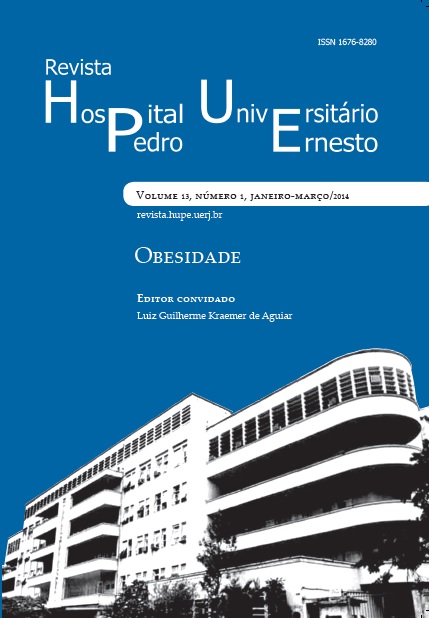Lipemia pós-prandial e incretinas na reatividade endotelial
DOI:
https://doi.org/10.12957/rhupe.2014.9809Abstract
A obesidade é uma doença crônica cuja prevalência vem aumentando consideravelmente, tornando-se um grave problema de saúde pública. Na atualidade, um dos principais motivos para o aumento em sua prevalência está relacionado às mudanças nos hábitos alimentares com privilégio para um maior consumo de refeições ricas em gorduras, principalmente as saturadas. Além disso, essa ingestão excessiva de gorduras tem ocorrido em intervalos cada vez menores entre as refeições, o que resulta em um aumento exagerado e prolongado dos níveis de lipoproteínas plasmáticas no período pós-prandial. Tal fato gera o prolongamento e a exacerbação do estado de lipemia pós-prandial (LPP). A LPP tem sido apontada como fator de risco para doenças cardiovasculares (DCV). Em obesos, as consequências da LPP são agravadas pelo excesso de gordura visceral, a qual se relaciona com resistência insulínica (RI) e hiperinsulinemia. Estas alterações da homeostase glicêmica associadas à LPP alteram a função vascular e podem promover disfunção endotelial não só em períodos de jejum, mas também no período pós-prandial. A disfunção endotelial é considerada um marcador precoce para o processo aterosclerótico capaz de elevar o risco de eventos cardiovasculares, como o infarto agudo do miocárdio.As incretinas são secretadas durante a digestão dos alimentos por células específicas localizadas no intestino. Sua principal função está relacionada ao controle da saciedade e a sua ação positiva na secreção de insulina. Entretanto, estudos recentes demonstram que as incretinas, em especial o peptídeo-1 glucagon-símile (GLP-1), podem exercer também efeitos benéficos sobre o sistema vascular. Sua ação pode estar reduzida em diabéticos do tipo 2 e esta redução está intrinsecamente relacionada com a fisiopatologia desta doença. Em diabéticos do tipo 2, a redução dos níveis de GLP-1 pode determinar um prejuízo à saciedade, à secreção de insulina glicose-dependente e ainda associar-se ao aumento do risco de DCV. Em obesos sugere-se que esses efeitos seriam similares, e talvez atenuados, àqueles observados em pacientes com diabetes do tipo 2. Assim, esta revisão tem o objetivo de mostrar o papel das incretinas na modulação lipídica durante a LPP e sua relação com a reatividade endotelial, com foco em estudos em indivíduos obesos.
Descritores: Obesidade; Endotélio; Incretinas.
Revista HUPE, Rio de Janeiro, 2014;13(1):80-86
doi:10.12957/rhupe.2014.9809


